By Mary Duggan
When my beloved dog Ceiliedgh died at age 15 she had a soccer ball sized tumor hanging from the side of her body. She had carried this expanding growth for five years, a constant and terrifying source of concern for me and visible to one and all. At the time of her death it weighed in at about 20 pounds and required constant care. Ceiliedgh had adapted bravely to its growth, her spine twisting and distorting in an ongoing effort to maintain balance and mobility as she adapted to being a 60-pound border collie on a 40-pound frame. It broke my heart that I had unwittingly contributed to her suffering and ultimate death.
A Walk on the Beach
Our first 10 years were really healthy, with few if any visits to the vet. We took our walks on the concrete sidewalks of Chicago’s North Side and exercised 12 months of the year on its sandy beaches. Despite a lifelong love affair with the beach, I longed to return to Beverly, to the expansive lawns, verdant gardens and dense shrubbery of my childhood home on the South Side. Finally, when Ceiliedgh was 10 years old, I got my way – a sweet little cottage on the very street where I had grown up. Poor Ceiliegh got something entirely different.
Ceiliedgh got an exhausted liver and a king-sized tumor. My sisters and I got buckets of worry and thousands of dollars in veterinary care. We quickly learned the drill from the army of veterinarians we consulted. A dog walks on grass that is sprayed with pesticides. Unlike us, the dog is not wearing shoes and socks and pants. The dog is slathered with deadly pesticides. The dog’s liver does all it can to process the chemicals and purify the body. At a point, it becomes overwhelmed and the poisons are stored in tissue. Ceiliedgh’s storage unit sat almost exactly on top of her defeated liver. With each year that we walked the carpet-like lawns of our beautiful neighborhood, Ceiliedgh got weaker and weaker and her storage unit tumor got bigger and bigger, the skin stretching to accommodate the ever-growing mass.
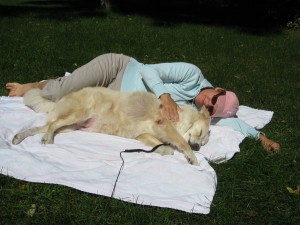
A favorite photo of a favorite memory. Ceiliedgh and Annie napping. Ceiliedgh’s tumor clearly visible.
I Can’t Afford To Be Your Neighbor
My anger and frustration over Ceiliedgh’s needless suffering fueled many of our public speaking engagements. Invited to tell our deodorant and lymphatic health story, I couldn’t not speak about Ceiliedgh. At one school, the opening slide in our Power Point presentation was simply the dollar amount $1,750. The caption read: I CAN’T AFFORD TO BE YOUR NEIGHBOR! $1,750 was the amount of money I had spent just that week keeping Ceiliedgh alive.
She did not have cancer. Years of a grain free, raw foods diet, regular chiropractic adjustments, acupuncture, and gentle yet effective homeopathic remedies for all her pain needs had afforded us an amazingly healthy dog: if you could put the ever-expanding volleyball of a growth along her right rib cage out of your mind. All of this from my dog innocently and legally relieving herself on the soylent green lawns of Beverly. Her vets correctly counseled that she was maimed by our neighbors’ actions, but not terminal. For five years, we fought the good fight while Ceiliedgh and I walked the long-sought-after streets of Beverly, incredulous at the sprayed lawns in the front yards of neighbors with cancer! Five years after the growth began, we lost her quickly and sadly on Valentines Day. Just moments after what was to be her final walk, the tumor burst open as she lay in her bed and she was gone within the hour. A perfect day of transition for one of the most loving creatures I have ever had the joy to know; my darling Valentine. I had hoped with her death that my anger would recede. I was wrong.
Déjà vu All Over Again
From all over the world, and yes, from many of our dear neighbors, came condolences. With Ceiliedgh’s death I knew I had come to the end of my dog-owning years. Having buried three adored dogs in my lifetime, collectively a span of some 45 years, I simply could not take the heartache one more time. I also doubted that I had the necessary stamina any longer to make the exercise commitment. The need for freedom and staggering veterinary bills informed my resounding NO when Annie came home from the local vet, some seven months after Ceiliedgh’s death, with a tale about a dog needing a home. Surely our four aging cats were enough expense, companionship and work, I reminded her. Boy, was I wrong.
Annie gave us the back-story on Chester, the dog in question: a Pomeranian mix whose owner had boarded him at the vet when she turned ill. Her health had gone from bad to worse to hospice. A lawyer had been given the Power of Attorney to approve Chester’s new home, upon his owner’s death – a process that had left Chester in a crate in the animal hospital for over three months. The staff was absolutely in love with Chester and determined to find a wonderful new family for him, now that his adoption was legally permissible. I sensed that this story was determined to have a happy ending. I tried a redirect.
What in the world, I asked, is a Pomeranian? Please guys, not one of those yappy little dogs, I said from my superior position as the owner always and only of “real” dogs – dogs, that is, starting at 40 pounds or so. Then, as is so often the way when large and unseen forces are at play, everywhere we turned we met people with Pomeranians or should I say people crazy nuts in love with Pomeranians. And there was the matter of Clare.
Clare had talked about having a little dog for so many years that I felt doomed from the start of the discussion. Life had been raining down so much heartache and loss on her in recent years that I hated being a naysayer in her life. It was only fair, after all, that she have the opportunity to make her first dog choice. I had made mine more than once and Annie had made hers and it was Clare’s turn. But, she never pushed or pestered, opting instead for the subtle let’s go to the vet and take him for a walk and see how it goes technique. And that’s how after lots of long debates, and meeting lots of well-loved Pomeranians on our dog-less strolls through our neighborhood, we became the proud new mommies of Chester. Who as it turns out isn’t much of a Pomeranian after all.
Bespectacled, black snouted, and quite chunky, Chester’s Keeshond genes appeared to be quite dominant and enough comments from Pomeranian owners to that effect led me straight to the Internet to learn more about this, I thought, kind of goofy looking dog. Of course, I quickly changed my rash opinion about his looks – dapper little gentleman that he is. I was soon to learn that his dashing good looks were the least of his stellar qualities.
A Dutchman Worth Smiling About
First of all, Keeshonds, a Dutch name, were once a popular breed in the Netherlands, working on barges in the canals, and named for a Dutch revolutionary. So I knew that this was indeed Clare’s dog and a link to the fifteen years of life she’d lived in Holland and possibly a consolation prize for the ultimate heartache one lousy Dutch man had caused her. Chester has this funny way of holding his mouth into a wide grin when he really wants to capture your heart. We were to learn that this ability had garnered the nickname of Smiling Dutchman for the Keeshond breed. So, he was Clare’s without a doubt; but despite my reservations he was winning my heart as well.
One of the first lessons I learned from Chester was that I am able to carry grief and joy in my heart at the same time. I would find myself laughing over some Chester shenanigans only to experience a wave of love and grief and longing for my Ceiliedgh at the very same time. But, there was a deeper connection for me that unfolded almost upon his arrival. As Chester bravely took on our tiny little home, three Moms, and the scary new reality of CATS EVERYWHERE, or practically so, I was to watch and learn a thing or two about bravery myself.
Keeshonds Excel at Comfort
Everywhere I turned were stories of Keeshonds and their reputation for being phenomenal service and therapy dogs. The night we bought Chester home I watched a local Chicago TV station reporting on the awards ceremony for service and therapy dogs at a very prestigious local hospital. There in the mix of noble breeds was a dead ringer for Chester. I began to look at Chester through a new set of spectacles myself; but more importantly I began to look at my sisters who clearly had a plan unfolding. I began to feel a critical mass of synchronicities forming around me and knew from past experience what that always meant – a change was in the offing.
Smiling Again, After the Dutchman
First and foremost was Clare’s smile, the smile that Chester was restoring. Chester and Clare bonded immediately. Chester was able to draw Clare bright-eyed and sweat suited from her bed early in the morning – no small feat when you are up against a lifelong night owl. They snuggled and rough-housed and walked, with Clare constantly scooping up a very patient Chester in her determination to make a lapdog out of Chester’s 30 pound self. She carefully charted each meal, each poop, and each new behavior like any new mommy. She delighted in his friendliness, his absolute insistence on meeting each and every neighbor, and his big boy bravery upon meeting so many of the large dogs on our block – this despite warnings from the vet that he didn’t do well with other dogs. I, meanwhile, delighted in my granny-like role of enjoying Chester’s adorable presence in our lives without any real responsibilities. But a peripheral relationship with Chester was not our mutual destiny as Chester immediately exhibited the special qualities that we would soon come to recognize as his larger gift to our family. It began in the car on his very first ride home from the vet.
Chester Goes for a Car Ride
I had not gone to the vet for the formal adoption. Memories of Ceiliedgh dying there a few months earlier made it still really painful to even pull in the parking lot. And, I just don’t do well in the car anymore, even as a passenger – a typical Traumatic Brain Injury (TBI) aftermath. I pick and choose carefully the times I am willing to ride in the car. My inability to ride in the car without significant and painful neurological “episodes” had caused me to severely limit that particular activity. So I waited at home for Chester’s arrival. And therein lies the wonder in all of this. From his first ride with the Duggan sisters, Chester exhibited an amazing poise, a regal composure – a very un-dog-like sense of himself as being on-duty, ready and available for service. Our first clue was that first car ride. Lots of research on the Internet, discussions with multiple vets, and an unfolding of amazing events over the upcoming months completed the puzzle
Service Dogs Can’t Be Bred
No movement, no jumping, no standing to look out the window, no pacing back and forth, no barking, and no trying to get in the front seat. Clare was agog with stories about Chester’s first journey home. Mary, you have to ride with this little guy. He’s amazing. It’s like he spent his life in a car. It’s like he was trained or something. You have to give him a try – and so, with all the remarkable joy of Chester’s first weeks with us, for me there was a particular sense of wonder. Chester and I began to travel together. In the back seat, where I used to travel with my eyes closed, sometimes even lying down to make the horrible imagery go away, my vision was being restored. All the vistas and all the views, riotous urban snarl and pastoral scenes alike – everything was there for me again. All the observing, and all the conversation, and all the fun were back. I simply had to keep my left hand gently resting on the soft back of the steady and steadying soul beside me. It couldn’t be. But it was.
More research, more questions, more testing and complete frustration that we knew almost nothing about his life before he joined our family. It was amazing. At home Chester was a laugh riot, and Clare’s number one playmate. Within three weeks he found his amazing voice (we were amazed as he exhibited the vocal range of a chanting Buddhist monk), and took on the role of loyal guard dog. He quickly realized that his life as a yard dog was over, and at six years of age he adjusted well to walks with a leash, clearly relishing his role as the cute new boy on the block who got everyone’s attention and everyone’s smile. But from the jump, with me, he was different — attentive in a fashion, more reserved, very solicitous, and on a regular schedule “scanning” me. That’s the only way I can describe it. He would scan me with his eyes and I could feel the depth of his perceptual abilities. “He is scanning me.” I kept repeating it to anyone who would listen. I agreed more and more often to going places in the car, provided Chester was with me.
With a TBI you don’t handle disappointment well. You thrive on routine. Multi-tasking is a thing of the past. The list goes on and on. You live in a changed reality. You might appear the same on the outside to casual acquaintances and even your loved ones, but inside the world is no longer familiar. It becomes, at times, a really scary place. Your rewired brain gets caught up in looped and loopy thinking and emotions and sometimes you just don’t know how to make them stop. Chester understood that somehow and the simplest contact with his body stopped the hyper-reactive cycle and comforted me. I don’t know any other way to describe it. More research ensued – more discussion with our vet. Not knowing if he had been trained, and if so, how much we looked into additional training by service dog organizations. In the interim, Chester was so busy accompanying me as my “service” dog that there was no time to confirm just how he knew to do what he knew how to do.
A Spoonful of Chester Makes the Medicine Go Down
He began to accompany me every week or so to the dreaded appointments for Cranial Sacral adjustments and acupuncture, two healing modalities that have contributed so much to my recovery. After 10 years of these appointments, I was growing increasingly agitated and angry about requiring so much medical attention. I resented the thousands of dollars required to keep me pain free and functional. I resented the hours and hours of travel just to get to and from the doctor, let alone the hour long wait that frequently preceded the almost 2 hour long treatment. I was driving my sisters crazy with needing to go but not wanting to go. Chester changed that and profoundly so — with Chester at my side doctor appointments improved dramatically. I was getting better results, and tolerating the experience much better. Chester slept soundly throughout my appointments, stretched out in the corner, snoring so loudly that I frequently had to laugh. I felt so much less alone in my situation. My doctor and his staff fell absolutely in love with Chester, frequently greeting Chester first or even ignoring me completely. And I loved that. Patients calling to make appointments began asking if Chester was going to be in the office at the same time, especially the parents of really young patients. And I loved that even more.
Little by little Chester was fulfilling the role of service animal in my life and I was amazed but really resistant. As much as I loved what Chester was restoring in my life I was confused and angry that I had gotten to a place in life where this sort of assistance was actually necessary. I had always kept my TBI well hidden. Outside of family and my closest friends, most folks did not identify me as a person with a disability. With a dog in tow, sitting beneath my chair in restaurants, hanging out in dressing rooms in department stores, creating quite a bit of attention, bringing stares and occasionally even hostility, I was feeling more disabled than ever. It took my ever-patient sisters to remind me that I might be feeling more disabled than ever; but I was feeling that out of the house. Out of the house, and off the couch, and back in the car and on the go, free of neurological snafus so painful that it had steadily become not quite worth it any longer to be out and about.
Chester was making so much possible again, even fun again. But I was determined to keep him at arms length, a purely professional relationship, if you will. I was done having my heart broken by dogs. I could not imagine how I was going to manage this even more intensive relationship long term. What in the world would I do if I had to travel by airplane? Would I ever be okay without him again? And seeing how agitated he became if I went anywhere without him, was that a problem, as well? My sisters counseled one day at a time, while my doctors and our veterinary specialist counseled me to accept the great gifts that Chester had to offer.
Feeling that I didn’t really deserve this assistance weighed on me and profoundly so. I had been living somewhere on the disability spectrum for a decade; but I was not ready for this part of the program at all.
Even though Chester would run across the room, put his front paws in my lap and hold my gaze in an amazing manner that stopped my neurological and emotional meltdowns in no time at all, I was having a hard time accepting his contribution to my life. I still thought of service dogs performing the unbelievable tasks of seeing-eye dogs. They were seriously big Labradors or German Shepherds, not 20 pounds of curly tailed cuteness. They pulled wheelchairs and turned on lights and anticipated drops in blood sugar and the advent of seizures; the stuff of heartwarming and mind blowing documentaries and it was all overwhelming to me. But before I had a chance to fully adjust, it was all to change in a heartbeat.
Chester Has A Seizure
On the third Friday in April, Clare woke me up at 6:30 am, with the frantic words, “Mary, something is wrong with Chester!” I flung myself the few feet from my bed to Chester’s side. Wobbling and weaving, panting excessively, small droplets of blood forming on his lower jaw, tongue extended and dangling from the side of his mouth, eyes bugged out and unfocused and not responding to my voice, Chester was in the middle of some sort of frightening neurological episode and we didn’t know what to do for him. As our fear grew and fully awakened us, we were hit with the smell of dog urine. Our perfectly housebroken little gentleman had lost control of his bladder. The veterinary hospital from which we’d adopted him just seven months earlier did not open for 2 hours and we were determined to not take him to strangers at an emergency clinic. Was it a stroke, some sort of heart attack? All we could do was try to keep calm and not frighten Chester further as we waited for the veterinary hospital to open.
All Duggans Have Thyroid Disorders
At the time of adoption, we requested testing to confirm our suspicion that something was amiss with Chester’s thyroid. Tests confirmed our suspicions that his dry skin, thin and dull coat, low energy levels, buggy eyes and 30-pound weigh-in were likely caused by a thyroid disorder. And so along with transitioning Chester to a raw diet, green smoothies, lots of walks and monthly sessions with a dog groomer, we started him on a protocol of natural thyroid. We all have thyroid disorders and we all take Armour thyroid daily and have for years, so there was nothing scary about taking on a dog with a thyroid disorder.
Everything about Chester adapting to his new life with the Duggans, except the natural thyroid, was a big success. The vets were a little new to natural thyroid treatment, so we were all feeling our way. It soon became clear that the dose we were trying was too high and accounted for the frazzled, hyper, unrecognizable Chester confronting us each evening. So, we backed off on the thyroid, delighted in all the other wonderful improvements in his health, including a streamlined new weight of 20 pounds, and waited for his thyroid to level off. While we waited to see his reaction to a lower dose of thyroid, we were delighted and rewarded with his sustained vigor, lustrous fur and finally, a return to relaxed evenings. We needed to maintain the program for a few weeks before retesting. A few weeks proved too long.
April Showers Bring Trucks Spraying Chemicals
As our neighborhood greened up and bloomed out weeks ahead of schedule, the small white flags warning that a pesticide had been applied to our neighbors’ lawns began to appear at regular intervals. A red warning flag should have been going off in our brains, as well, especially given the heartbreaking journey of our beloved Ceiliedgh. But in all the excitement over Chester becoming a member of our family we failed to make the connection. From the minute flags began to appear Chester began to change. We knew that we’d been successful with his weight loss program by walking him vigorously a few times each day. But almost overnight he could barely make it to the corner, let alone around multiple blocks. Going from bad to worse in a matter of days he wasn’t able to go more than two doors from home; often laying down to rest after doing his business. Ironically, his early morning walks began to get shorter and shorter, while taking more and more time to complete. He simply didn’t have the strength to get home. Overnight his appetite became ravenous, his thirst incessant, and his weight gain visible and rapid fire. We were days away from his scheduled thyroid retest when it all fell apart.
We’d always taken Chester’s harness off at the end of the day, part of his end of the day ritual of play-time, massage, snuggles and bed. Putting the harness back on in the morning was a laugh riot, with Chester even picking up his harness and carrying it to us when he wanted to go out. Then one morning, while Annie was putting Chester into his harness the scenario changed completely. Chester snarled and snapped. Thinking she had pinched a hair or two in Chester’s phenomenal furry collar, Annie tried again to secure the latch. Then Chester bit Annie – twice. We were rattled and confused and I was frightened. Clare tried and got the same reaction. Chester’s gaze seemed to say, guys, I need to go out now and I will not wear that harness, so figure something out. Clare had the brilliant idea to give him a homeopathic pain tincture, wait a bit and try again with a simple and contrived looping of a soft training leash to get him secured and out the door.
Chester slept that day like he was 100 years old. The next morning we awoke to the seizure. Actually it took a trip to the vet to confirm that Chester had endured a seizure, the first of seven that were to occur over the next few days – each one lasting about 25 terrifying minutes. As the vet tipped Chester’s head back to see where he had bitten his own mouth, Chester bit the vet. As we described the unraveling of the previous few days, and blood was drawn for testing, the vet explained what we already knew all too well. Chester’s immune system was very compromised due to his thyroid malfunction. Lawns that he was walking on had been sprayed with pesticides that are known endocrine disruptors. The thyroid gets even more damaged, the adrenals, as well — extreme fatigue and increased appetite and thirst are the telltale symptoms. The liver tries desperately to cleanse the blood and purify the body from the chemical poison and becomes overwhelmed in the process. The brain stem becomes painfully swollen, the neurological system overtaxed and seizures follow. Just trying to get his harness on had been an early clue that the brain stem was swollen and unbearably tender.
Housebound again.
We never left Chester unattended for weeks, as we carefully monitored his painfully slow recovery. The paradigm of our lives had shifted. No longer well enough to accompany me anywhere, Chester now required constant monitoring. My own brain specialist performed treatments on Chester’s brain stem and skull, trying to relieve the intense pain accompanying seizures. We did not dare leave him for even a minute. Clare going out one night to an important class reunion left him so agitated that it brought on a seizure – one of his worst and longest lasting. Our fastidious little pet now had frequent “accidents.” We meticulously administered his now significant drug protocol and patiently accompanied him on his laborious walks. Already hooked on the joys of the block, he was not willing to do his business in chemical-free safety of our back yard. We began to comprehend quickly the difficulty in trying to keep him off the toxic lawns. For every neighbor who used professional and identifiable chemical companies there was another do-it-yourselfer applying cheaper and even more deadly lawn sprays.
Chester’s personality changed, as well. No longer able to take the lively ebb and flow of activity on the block from his perch behind the glass door in our foyer, Chester now insisted on being taken downstairs, sleeping all day in the deodorant factory, in a small, cold and dark storage closet adjoining the furnace room, his exhausted body tucked tightly behind an old skirted chair. He would try to bark, but he was unable to; realizing he couldn’t, he would produce a soft, pained whimper instead. Petting him had to be done carefully to not trigger pain and the doctor showed us how to touch and comfort him without hurting him. My own doctor reminded me of how I too had sought out small, dark, quiet spaces in the first year following my brain injury. The brain needs and wants this deprivation in order to heal. I too remember the gentle yet painful hug from a friend that reduced me to tears just as our photo was being snapped. These many years later, I still hate looking at that photo taken just 2 weeks after my fall.
Two Months Later
I don’t think of Chester any longer as my service dog. I just want him to heal completely. He’s made great strides. He most certainly has his bark back. He has good days with his meds and some that are not so good as his tummy adjusts to tweaks and changes to his protocol. Clare is pretty much near exhaustion as he no longer sleeps through the night and so she is up and down throughout the night, more a new mommy than she was even in our first days with Chester. He still spends his days and his nights in the basement, tucked behind the little yellow chair. I miss him being upstairs with me. Clare misses snuggling on the couch in the evening. Everything is pretty much messed up.
Still Strolling the Street of Death
Annie takes Chester for a lot of his 6:30 am walks, as Clare is often too sleep deprived to take that shift. It’s a great time for interacting with our neighbors, as lots of folks are tumbling out of their houses, across their bright green lawns, and off to their jobs. Slowly, with each passing week, Chester has been able to venture further and further a field. Now two months into this he has finally gotten all the way to the corner – we live in the middle of the block. We have lots of wonderful neighbors, and many great animal lovers among them. Many have heard that Chester has been ill and have been truly solicitous. Some of them have gone out of their way to make sure we know that their lawn is not chemically treated in any way. Chester is safe in front of their homes.
One morning a lovely neighbor and Annie were chatting, while Chester waited patiently at Annie’s feet. She mentioned to Annie that she heard we’d been having some trouble with Chester and that particular morning it hit a nerve with Annie. Actually, she said, we’re having trouble with some of our neighbors spraying deadly chemicals on their lawns. She then proceeded to relay Chester’s saga and how the sprays were killing our pets, not to mention ourselves. The neighbor, standing before her lawn that was more of a perfect carpet than a lawn said, “Well, we haven’t heard anything about that.” The conversation ended. The neighbor, recently diagnosed with thyroid disease and not having any luck with Synthroid, went back into the house she shares with a husband who coughs and spits up mucus 24 hours a day. It is always dismissed as allergies, but it’s hard to believe that COPD or Emphysema is not the real cause. They have a sweet new dog standing at the front window barking. Their other beloved dog died last year from rapid onset cancer. Her mother-in-law is my next-door neighbor. Well, she used to be but she passed away last year from cancer. She’s gone but her yard is still relatively weed free from the incessant spraying. The new owners, thank God, are into natural lawn care; but to my immediate right the lawn has been sprayed so incessantly for weeds that it is completely dead. The guy across the street mows all of our lawns on Monday mornings. He’s a great dog owner, with a sweet new pup. His wife is five years out from breast cancer; but his 10-year-old dog died last year from rapid onset cancer. I could go on like this forever, it seems, but I just don’t have the heart for it. Verdant green lawns, it seems to me and Chester is such a crazy ass thing to suffer and die for. I could weep, if I wasn’t so angry.
Post Script: A Recipe for Healthy Lawns and Healthy Pets
When Annie read this blog entry she said Mary, we’re the Duggans, we can’t end on such a discouraged note. So, I am including a link here to a some inspiring guidance from the Rodale site. We are determined that we are going to take our lawn from chemical free to WOWIE! Care to join us? See how here.
About the author:
Mary Duggan is Co-Founder and President of the Duggan Sisters.
The Duggan Sisters cracked the code and created a natural deodorant that actually works: lifestinks. We hope you will spend a few minutes exploring duggansisters.com to experience their spirited approach to wellness through their natural products and healing stories.
Tags: Organic Lawn Care, Pesticides, Service Dogs, TBI, Traumatic Brain Injury

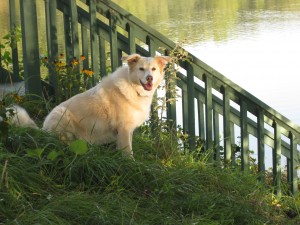
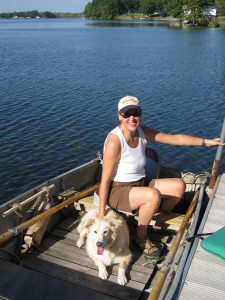
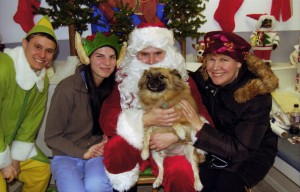
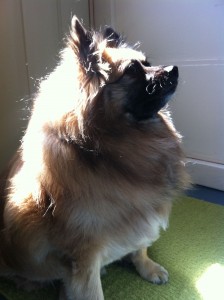


[…] I am deeply touched by folks who meet us in public and inquire after Chester, my service dog. I see the look of disappointment on their faces when they realize he is not with me. Then I see the look of real pain when I update them on his recovery and tell them just bits of what he has been through this past year. […]